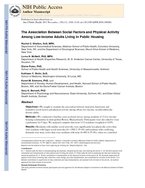0
Research
Community:
Apr 23, 2019
Sweeping changes designed to make the food more nutritious in a federal assistance program for low-income families reduced the risk for obesity for 4-year-olds who had been on the program since birth, according to new research.
Authored by: UCLA Fielding School of Public Health
Topics: Early childhood, Food insecurity, Low-income, Nutrition, Obesity, Research
 Shared by Housing Is
Shared by Housing Is
Housing Is posted a
on Apr 29, 2019
UCLA Fielding School of Public Health
Sweeping changes designed to make the food more nutritious in a federal assistance program for low-income families reduced the risk for obesity for 4-year-olds who had been on the program since birth, according to new research.
0
Publication
Community:
Sep 1, 2018
The firearm, obesity, and opioid epidemics are among the most important public health crises of our time. Each epidemic has a complex etiology that challenges efforts at mitigation. From this, a central question arises for researchers, clinicians, and policymakers: How can we identify what matters most within a broad range of causal factors in these epidemics, and can we draw cross-epidemic inferences that will help inform our thinking?
Authored by: Sandro Galea for Milbank Memorial Fund
Topics: Food insecurity, Health, Low-income, Nutrition, Obesity, Partnerships, Safety, Substance abuse
 Shared by Mica O'Brien
Shared by Mica O'Brien
Mica O'Brien posted a
on Jan 24, 2019
Sandro Galea for Milbank Memorial Fund
The firearm, obesity, and opioid epidemics are among the most important public health crises of our time. Each epidemic has a complex etiology that challenges efforts at mitigation.
0
Research
Community:
Nov 28, 2018
Public housing residents are more likely than urban residents not living in public housing to have high rates of obesity and smoking and low rates of physical activity. This study assesses whether adding environmental interventions at public housing developments affects residents’ health-related habits and body mass index.
Authored by: BMC Public Health
Topics: Exercise, Health, Housing, Low-income, Obesity, Research
 Shared by Mica O'Brien
Shared by Mica O'Brien
Mica O'Brien posted a
on Nov 29, 2018
Public housing residents are more likely than urban residents not living in public housing to have high rates of obesity and smoking and low rates of physical activity.
0
News Article
Community:
Jul 27, 2018
Health promotion interventions in public housing communities have the potential to reduce obesity among residents, a new study shows. Changes in their environment, such as fresh food trucks, walking groups, screenings, and cooking demos, helped Boston residents eat better and get more exercise.
Authored by: University of Washington School of Medicine
Topics: East Coast, Exercise, Food insecurity, Health, Housing, Low-income, Nutrition, Obesity, Research
 Shared by Housing Is
Shared by Housing Is
Housing Is posted a
on Jul 27, 2018
University of Washington School of Medicine
Health promotion interventions in public housing communities have the potential to reduce obesity among residents, a new study shows. Changes in their environment, such as fresh food trucks, walking groups, screenings, and cooking demos, helped Boston residents eat better and get more exercise.
0
Research
Community:
Jul 12, 2018
We sought to examine the association between structural, functional, and normative social factors and physical activity among urban, low-income, racially/ethnically diverse adults.
Authored by:
Topics: Exercise, Health, Housing, Low-income, Obesity, Research
 Shared by Housing Is
Shared by Housing Is
Housing Is posted a
on Jul 12, 2018
We sought to examine the association between structural, functional, and normative social factors and physical activity among urban, low-income, racially/ethnically diverse adults.
0
Case study
Community:
Jul 12, 2018
In Boston, Massachusetts, the Boston Housing Authority, Boston Public Health Commission, the city’s Inspectional Services Department, the Boston Foundation, and local universities and medical institutions have come together over the last decade-plus to address the intersection of health and housing. Motivated by a desire to improve the lives of Boston’s most vulnerable residents, these organizations began collaborating to address asthma and, more recently, to prioritize housing and health needs for pregnant women. By bridging anchor institutions, foundations, and city agencies around health and housing initiatives citywide, Boston has made strides toward providing healthier housing options and integrated health management and referral systems. This case study highlights how a variety of key stakeholders within one city can collaborate to address the health and housing needs of its vulnerable residents.
Authored by:
Topics: Asthma, Child welfare, Dual-generation, Early childhood, East Coast, Exercise, Family engagement, Funding, Health, Home visiting, Homelessness, Housing, Low-income, Medicaid / Medicare, Nutrition, Obesity, Partnerships, Pre-natal, Preventative care, Research, Smoke-free
 Shared by Housing Is
Shared by Housing Is
Housing Is posted a
on Jul 12, 2018
In Boston, Massachusetts, the Boston Housing Authority, Boston Public Health Commission, the city’s Inspectional Services Department, the Boston Foundation, and local universities and medical institutions have come together over the last decade-plus to address the intersection of health and housing.
0
Research
Community:
Jul 11, 2018
A Research Review and Comment on Future Directions for Integrating Housing and Health Services
Authored by:
Topics: Affordable Care Act, Cost effectiveness, Data sharing, Exercise, Health, Homelessness, Housing, Low-income, Medicaid / Medicare, Mental health, Metrics, Nutrition, Obesity, Partnerships, Preventative care, Research, Supportive housing
 Shared by Housing Is
Shared by Housing Is
Housing Is posted a
on Jul 11, 2018
A Research Review and Comment on Future Directions for Integrating Housing and Health Services
 Shared by Housing Is
on Apr 29, 2019
Shared by Housing Is
on Apr 29, 2019

 Shared by Housing Is
on Jul 27, 2018
Shared by Housing Is
on Jul 27, 2018

 Shared by Housing Is
on Jul 12, 2018
Shared by Housing Is
on Jul 12, 2018
 Shared by Housing Is
on Jul 12, 2018
Shared by Housing Is
on Jul 12, 2018
 Shared by Housing Is
on Jul 11, 2018
Shared by Housing Is
on Jul 11, 2018






